Embark on a journey through time with your book club! Historical fiction offers a unique window into the past, sparking deep conversations about culture, conflict, and the human condition across different eras. This genre masterfully blends meticulously researched history with compelling human stories, providing endless material for discussion. However, choosing the perfect title-one that is both engaging for all members and rich with discussable themes-can be a challenge. How do you find a story that will satisfy everyone and ignite a memorable conversation?
This guide is designed to solve that exact problem. We've curated a definitive list of historical fiction books for book club meetings that are guaranteed to get your members talking. Forget the endless searching and indecision. Each entry in this roundup provides everything your group needs to make an informed and enthusiastic choice for your next read.
You'll find a handpicked selection of titles celebrated for their narrative depth and historical accuracy. For each book, we provide:
- A concise synopsis to introduce the plot and setting.
- An analysis of the core themes ripe for debate and exploration.
- A set of tailored discussion questions to kickstart your meeting.
Our goal is to make your selection process simple, so you can spend less time searching and more time reading and connecting with your fellow book lovers. Let's dive into the titles that will transport your book club to another time and place, ensuring your next gathering is your most insightful one yet.
1. The Nightingale by Kristin Hannah
Kristin Hannah's The Nightingale has become a modern classic and a book club staple for good reason. Set in France during World War II, it tells the story of two sisters, Vianne and Isabelle, whose paths diverge dramatically under the brutal German occupation. While Vianne is forced to make impossible compromises to protect her family in her small village, the impulsive and headstrong Isabelle joins the French Resistance, risking everything to save others.
This novel is one of the most compelling historical fiction books for a book club because it masterfully balances a page-turning plot with profound emotional depth. It explores the often-overlooked roles women played during the war, moving beyond the battlefield to the domestic front, where the fight for survival was just as fierce. The narrative forces readers to confront difficult questions about morality, courage, and what it means to be a hero.
Why It's a Book Club Favorite
The Nightingale is an accessible yet powerful read that appeals to a wide range of readers. The story is driven by the complex and evolving relationship between the two sisters, providing a rich foundation for discussion about family dynamics, sacrifice, and the different forms of strength.
The novel’s exploration of moral ambiguity is particularly potent. Characters are faced with harrowing choices where there are no clear right or wrong answers. This complexity sparks deep and engaging conversations, making it an unforgettable shared reading experience.
Key Themes for Discussion
- The Nature of Courage: Compare and contrast Vianne's quiet, protective courage with Isabelle's overt, rebellious bravery. Is one form more valid than the other?
- Sisterhood and Conflict: Analyze the sisters' relationship. How does the war both strain and strengthen their bond?
- The Civilian Experience of War: Discuss how the novel portrays the daily realities and "impossible choices" faced by those living under occupation.
- Memory and Storytelling: Consider the novel's framing as a story being told by an elderly woman. How does this impact the narrative and its themes of remembrance?
Book Club Pro-Tip: Encourage members to research the real-life "Nightingales" of the French Resistance, such as Andrée de Jongh, whose story inspired Isabelle's character. This adds a powerful layer of historical context to your discussion and honors the real women whose stories were often lost to history.
This book is a surefire hit for any group looking for a moving, thought-provoking, and deeply human story. Its emotional impact and intricate character development ensure that the conversation will continue long after the last page is turned.
2. All the Light We Cannot See by Anthony Doerr
Anthony Doerr's Pulitzer Prize-winning novel, All the Light We Cannot See, is a breathtaking and intricately woven story set against the devastating backdrop of World War II. It follows two protagonists whose lives are on a collision course: Marie-Laure, a blind French girl who takes refuge in the walled city of Saint-Malo, and Werner, a brilliant German orphan who is enlisted into a brutal Nazi academy for his talent with radio technology. Their parallel journeys explore themes of fate, morality, and the human capacity for kindness in the darkest of times.
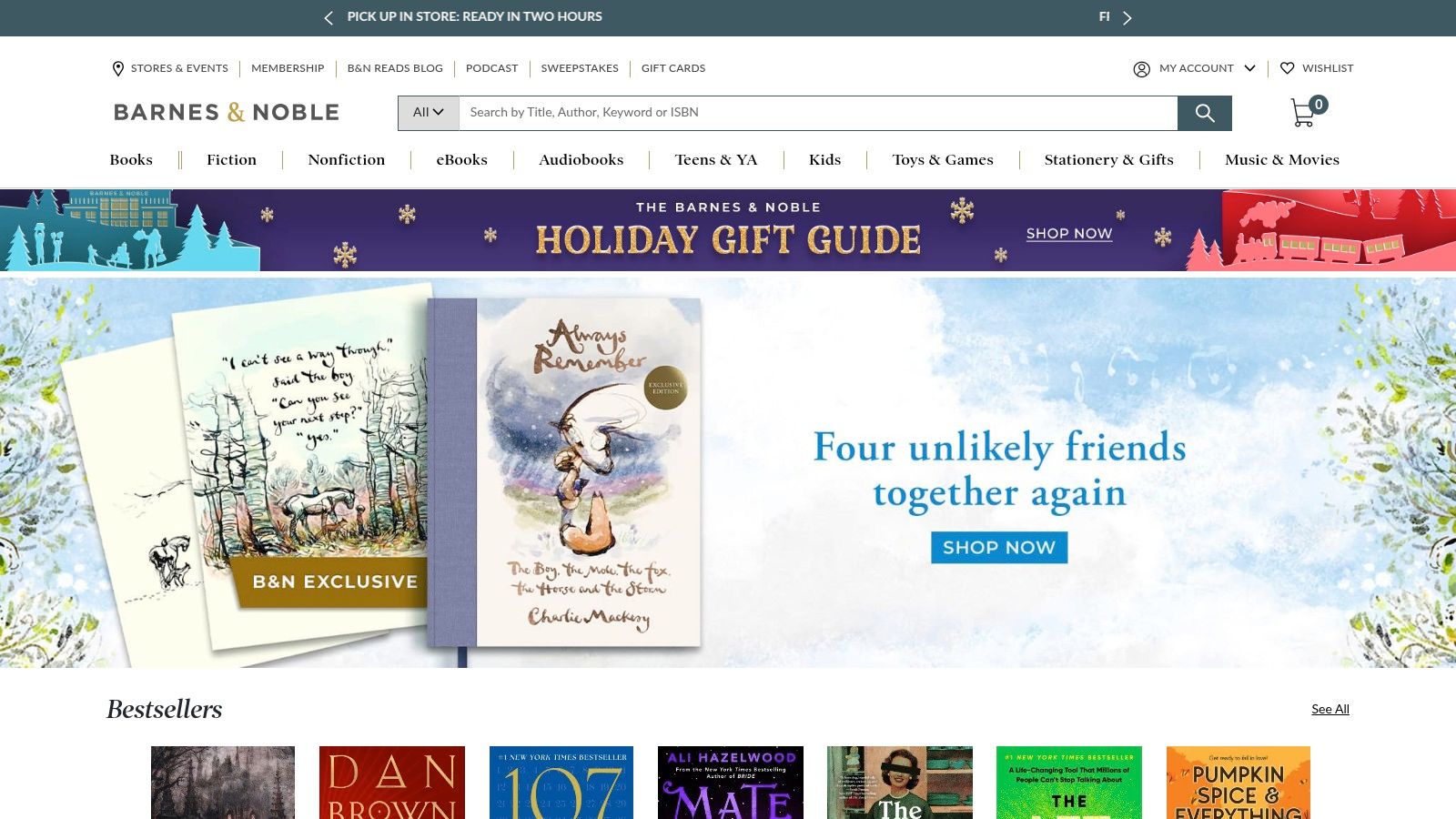
This novel is a phenomenal choice for historical fiction books for a book club due to its lyrical prose and unique structure. Doerr employs very short chapters that alternate between Marie-Laure's and Werner's perspectives, creating a compelling narrative rhythm that builds suspense while offering deep insight into their inner worlds. The story beautifully illustrates how war impacts individuals on both sides of the conflict, forcing them to navigate a world where choice is a luxury and survival is paramount.
Why It's a Book Club Favorite
All the Light We Cannot See offers a literary experience that is both intellectually stimulating and emotionally resonant. The unconventional narrative structure is a fantastic point of discussion, allowing clubs to analyze its effect on pacing and character development. The novel’s rich symbolism, from the mythical Sea of Flames diamond to the power of the radio, provides ample material for a deep and multifaceted conversation.
Unlike many war novels that focus on battles and strategy, Doerr’s work prioritizes the sensory and emotional experiences of its characters. This intimate focus allows readers to connect deeply with Marie-Laure and Werner, sparking conversations about empathy, determinism, and the unseen connections that bind humanity together.
Key Themes for Discussion
- Technology and Morality: Discuss the dual role of the radio as a tool for both enlightenment and propaganda. How does Werner's journey reflect the moral compromises often demanded by scientific advancement?
- Light vs. Darkness: Explore the literal and metaphorical use of light and darkness throughout the novel. How does Marie-Laure's blindness shape her perception of the world and the people in it?
- Individual vs. State: Analyze the pressures placed on both Werner and Marie-Laure by the overwhelming forces of war and political ideology. How do they attempt to retain their individuality?
- The Nature of Story: Consider the non-linear timeline and the short, fragmented chapters. How does this structure enhance the novel's themes of memory, fate, and interconnectedness?
Book Club Pro-Tip: Play a short piece of classical music mentioned in the novel, like Debussy's "Clair de Lune," at the start of your meeting. This can help set the tone and immerse your members in the sensory world Doerr creates, leading to a richer discussion about the role of art and beauty during wartime.
This book is perfect for groups that appreciate beautiful writing and a character-driven narrative. Its poignant exploration of human connection and resilience ensures it will be a memorable and impactful choice for any book club.
3. Bookshop.org
For book clubs that want their monthly reading to have a positive impact, Bookshop.org offers an ethical and community-focused way to purchase books online. It's an online bookstore with a mission to financially support local, independent bookstores. When you buy a book, a portion of the profit goes into an earnings pool that is evenly distributed among independent bookstores, or you can choose to directly support a specific local shop.
This platform is a fantastic resource for sourcing historical fiction books for a book club because it combines the convenience of online shopping with the conscience of supporting small businesses. The site functions as a central hub, shipping books directly from a major wholesaler, which ensures a wide selection of titles is available. It’s the perfect solution for groups whose members are geographically scattered but share a common goal of shopping small.
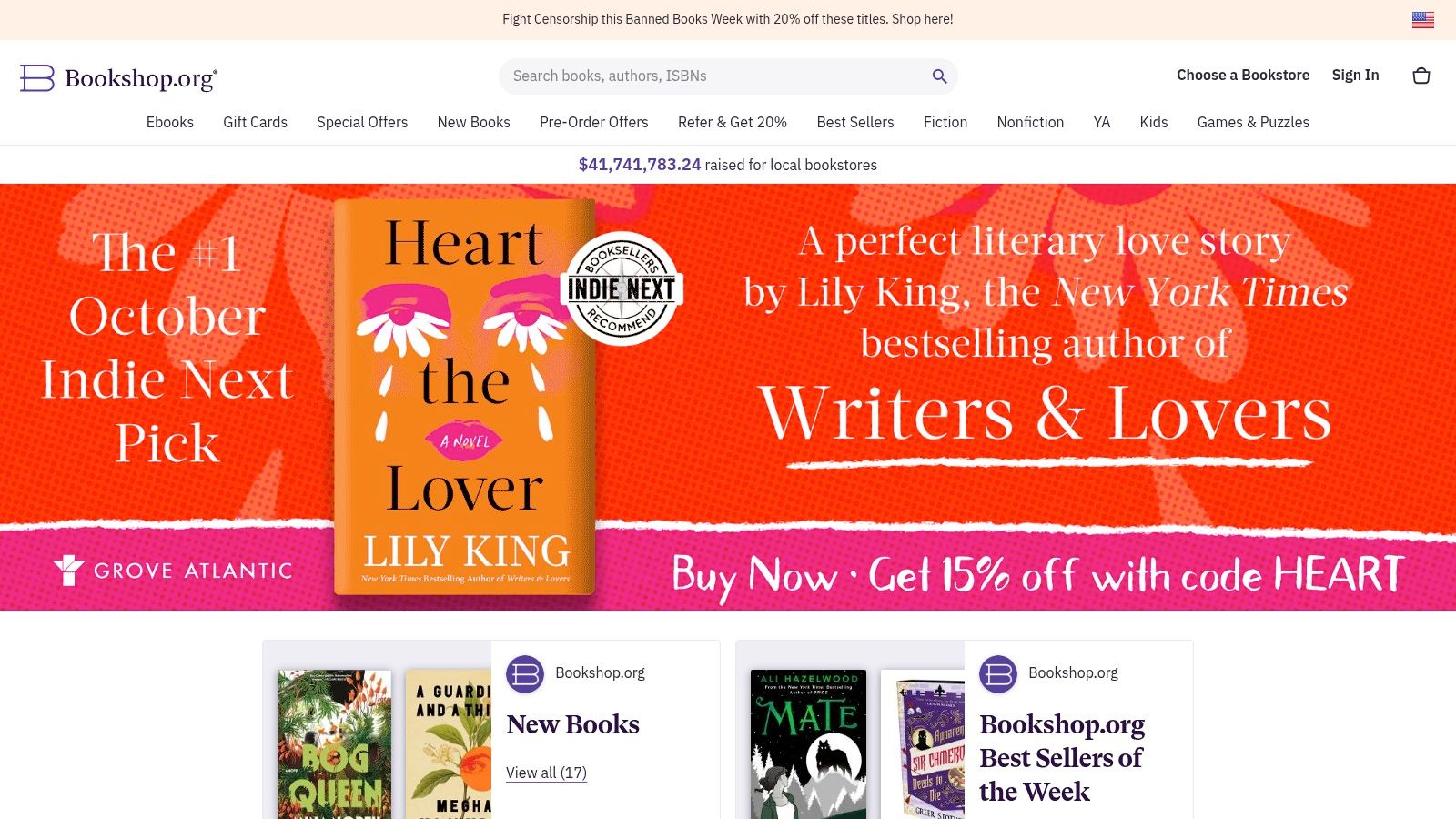
Why It's a Book Club Favorite
Bookshop.org is built with readers and communities in mind. One of its standout features for book clubs is the ability to create and share public book lists. A designated club member can curate a list titled "Our Book Club's 2024 Picks," add all the chosen books for the year, and share a single link with everyone. This simplifies the purchasing process and ensures everyone knows exactly which edition to buy.
The platform's B Corp and Climate Neutral certifications also resonate with many readers who prioritize sustainability and corporate responsibility. While it lacks the in-person pickup options of a local store, its transparent model and documented impact make it a powerful alternative to mass-market online retailers.
Key Features for Book Clubs
- Direct Support for Indie Bookstores: Choose a specific local bookstore to receive the full profit from your order, or let your purchase contribute to a general earnings pool.
- Custom Book Lists: Create shareable lists for your club's monthly picks, reading challenges, or themed collections, making coordination effortless.
- Affiliate Program: Book clubs or influencers can become affiliates and earn a commission on sales generated through their lists, which can be used to fund future book purchases.
- Wide Selection: Access a vast inventory of books, including new releases and backlist titles in historical fiction, ensuring your club never runs out of options.
Book Club Pro-Tip: Use the list-making feature to create an "archive" of your club's past reads. Add a short note to each book on the list with the month and year it was discussed. This creates a wonderful digital history of your club's reading journey that new members can explore.
By choosing Bookshop.org, your book club does more than just read a book; it actively participates in sustaining the vibrant ecosystem of independent bookstores across the country. It’s a choice that feels good and makes coordinating your reading seamless and effective.
4. Goodreads
While not a book itself, Goodreads is an indispensable free tool for any book club organizer. It's the world's largest social network for readers, offering a vast repository of book ratings, user reviews, and community-created lists. For those scouting potential historical fiction books for a book club, it provides unparalleled insight into what real readers are discussing and enjoying.
This platform excels at gauging a book's "discussability" before you commit. You can quickly see average ratings, read detailed reviews that often highlight discussion-worthy themes, and browse thousands of "Listopia" lists like "Best Historical Fiction for Book Clubs." It essentially allows you to crowdsource your next pick, ensuring it has the depth and engagement potential your group is looking for.
Why It's a Book Club Favorite
Goodreads streamlines the research process from discovery to discussion planning. Its active historical fiction groups often host monthly reads complete with pre-written discussion questions and spoiler-free threads, which can be a lifesaver for busy club leaders. The ability to see what your own friends are reading and rating adds a personal layer to the discovery process.
The platform is more than just a catalog; it's a community hub. By exploring public shelves and group discussions, you can identify titles that consistently spark lively debate. The sheer volume of user-generated content makes it easy to find books that tackle complex historical events and moral questions, which are the cornerstones of a great book club meeting.
Key Features for Book Clubs
- Listopia Lists: Browse user-curated lists to find popular and highly-rated historical fiction titles tailored to book club audiences.
- Community Groups: Join dedicated historical fiction groups to find monthly picks, discussion prompts, and a community of like-minded readers.
- User Reviews and Ratings: Quickly assess a book's suitability by reading reviews that often detail thematic depth and character complexity.
- Personal Shelves: Create and share shelves like "Book Club Possibilities" to keep track of titles and poll your group members.
Book Club Pro-Tip: Use the "Community Reviews" section to find what readers are already debating. Look for reviews that mention "great for discussion" or that pose questions about the characters' choices. This is a goldmine for crafting your own discussion guide. For more tips on organization, check out this guide on how to start a book club.
As a free discovery and planning tool, Goodreads is an essential first stop. While you'll need to source the books elsewhere, its powerful community insights will help you choose a historical fiction title that guarantees a memorable and engaging discussion for your group.
5. Libby, by OverDrive
For book clubs looking to eliminate cost as a barrier to entry, Libby is an indispensable tool. It’s a free, modern, and user-friendly app that connects you to your local library's digital collection of eBooks and audiobooks. All that's required is a valid library card, making it an incredibly equitable option for any group. Instead of purchasing copies, members can borrow titles digitally at no cost.
Libby is a game-changer for finding historical fiction books for a book club because it pools the resources of your public library system into a single, accessible platform. While it's not a bookstore, its function as a digital lending service ensures every member can participate, regardless of their budget. This focus on accessibility fosters a more inclusive and diverse reading group.
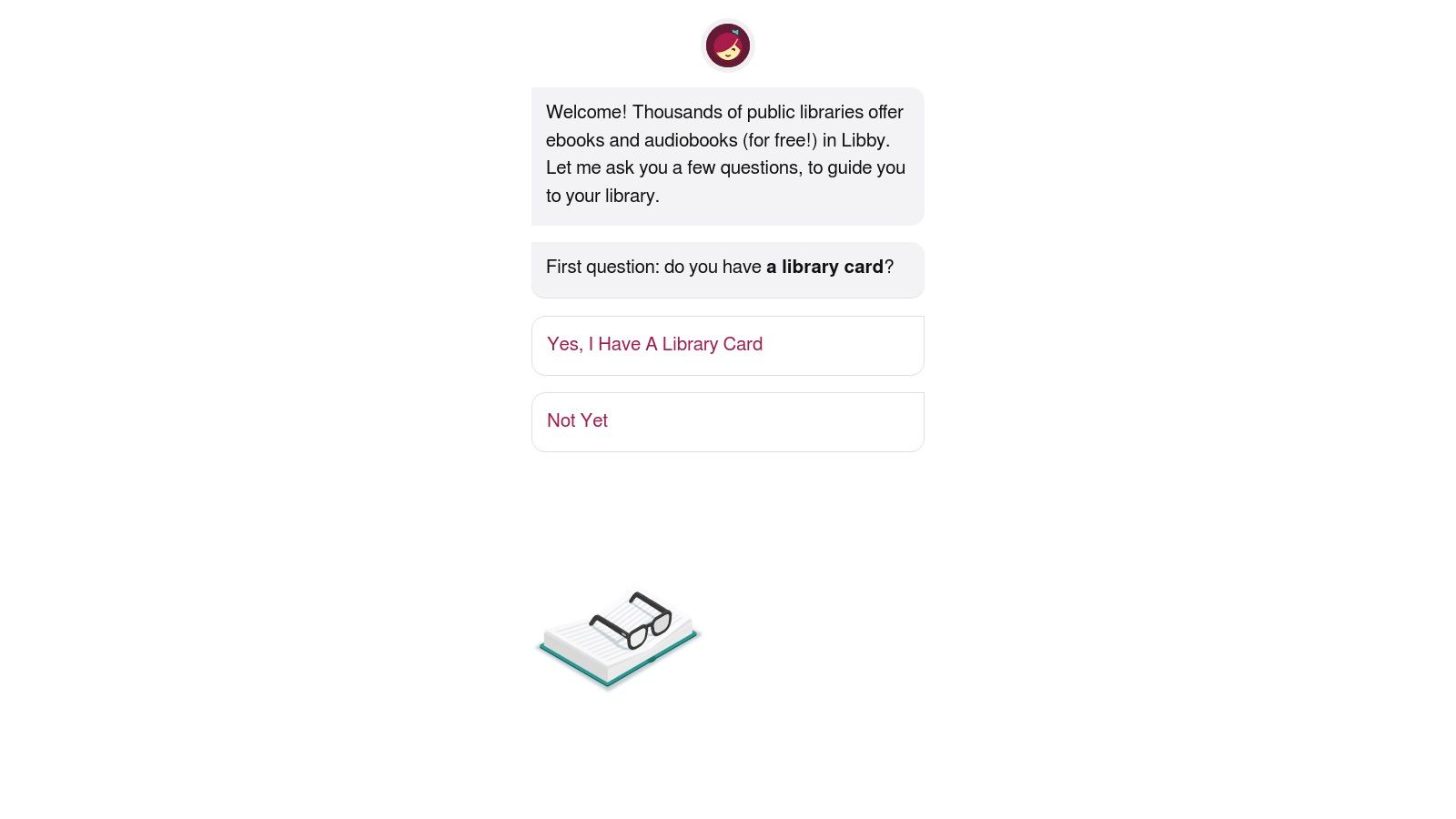
Why It's a Book Club Favorite
The primary advantage of Libby is its zero-cost model. It removes the financial pressure of buying a new book every month, which can be a significant hurdle for many readers. The platform also offers both eBook and audiobook formats, catering to different reading preferences and allowing members to listen on the go.
One of Libby's standout features for book clubs is its participation in special programs like "Big Library Read," a global digital book club. During these events, a selected title becomes available for simultaneous, unlimited borrowing without any holds or waitlists. This guarantees every single member of your club can get the book instantly, solving the common problem of long wait times for popular titles.
Key Features for Discussion
- Cost and Accessibility: How does using a free service like Libby change the dynamic of your book club? Does it encourage members to try books they might not have purchased?
- Digital vs. Physical: Discuss the pros and cons of reading digitally versus holding a physical copy. How does the format (eBook or audiobook) affect the reading experience and discussion?
- Library Curation: Explore how your club's selections are influenced by the digital catalog available through your local library. Does this introduce you to different authors or genres?
- Holds and Planning: How does your book club navigate potential waitlists for popular titles? Does it require more advance planning than buying books?
Book Club Pro-Tip: Encourage all members to add their library cards to the Libby app well in advance of your first digital pick. Then, create a shared "tag" or "wish list" within the app where members can add historical fiction suggestions. This lets you track potential holds and plan your reading schedule a few months ahead.
Libby is an outstanding resource for any book club that values accessibility, flexibility, and affordability. By leveraging the power of local libraries, it ensures that a love for reading is the only prerequisite for joining the conversation.
6. Penguin Random House
For book clubs that want to go straight to the source, Penguin Random House’s website is an invaluable hub. As one of the world's largest publishers, its online portal offers more than just a place to buy books; it's a treasure trove of resources specifically designed to enrich the reading experience, making it a fantastic starting point when searching for historical fiction books for a book club. The site allows you to browse an extensive catalog of historical fiction, from blockbuster bestsellers to hidden gems, all directly from the publisher.
This platform is particularly useful for its dedicated browsing pages and curated lists, which help clubs discover newly released titles and popular picks. But its standout feature is the vast collection of free, downloadable Reading Group Guides. These guides, often created in collaboration with the authors, provide thoughtful discussion questions, thematic summaries, and sometimes even author interviews, saving book club organizers hours of prep time.
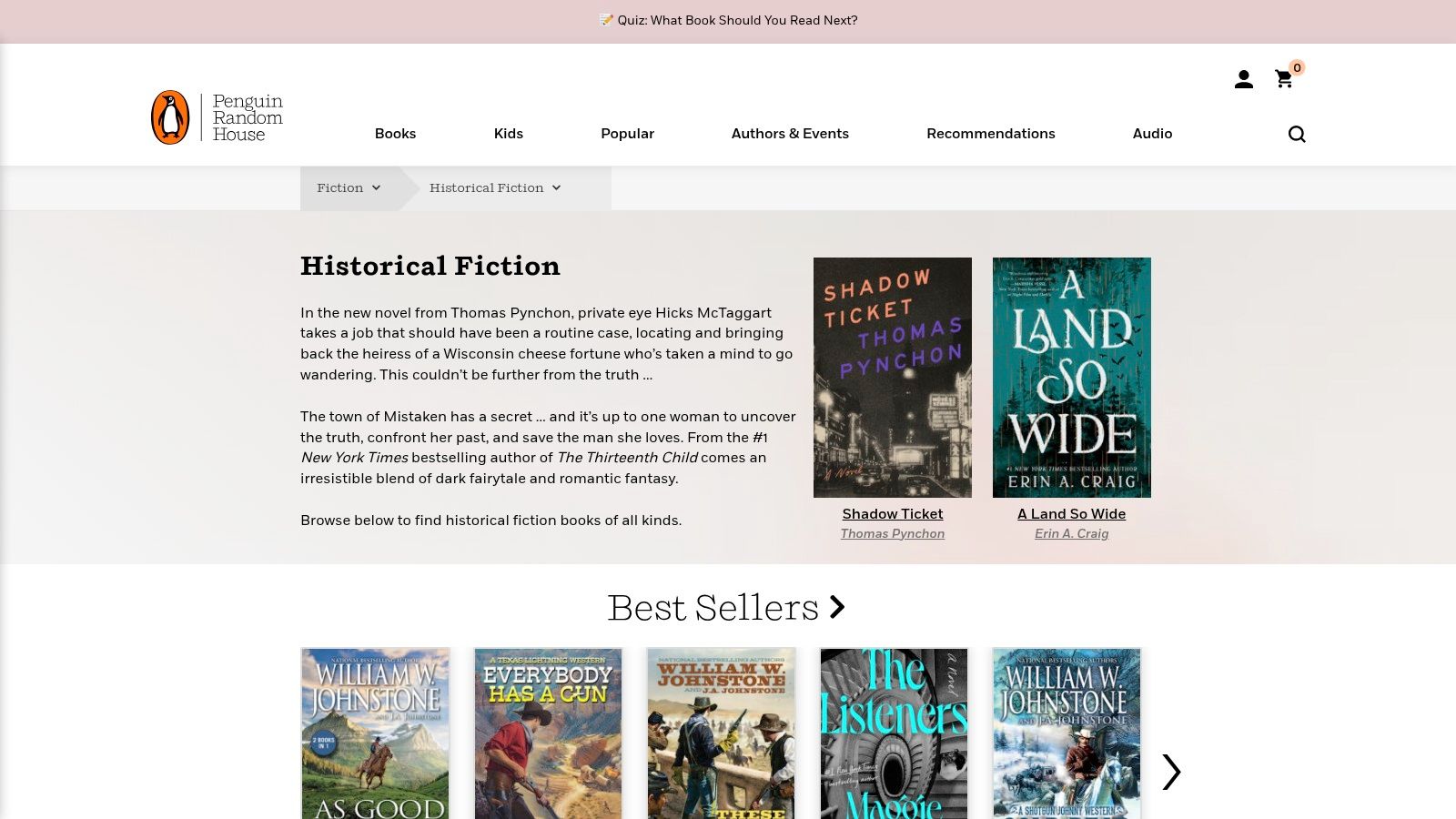
Why It's a Book Club Favorite
Penguin Random House streamlines the entire book club process from discovery to discussion. Instead of searching across the web for reliable discussion questions, clubs can access high-quality, author-approved materials directly. This ensures the conversation starters are relevant, insightful, and designed to explore the book's most important themes.
The ability to purchase directly from the publisher also guarantees you are getting the correct print edition, which is a small but crucial detail for ensuring all members are literally on the same page. While the catalog is limited to titles under its imprints (like Viking, Dutton, and Riverhead), the selection is massive and includes many of the most acclaimed historical fiction authors writing today.
Key Features for Discussion Planning
- Free Reading Group Guides: Access detailed, downloadable guides for thousands of titles. These PDFs are packed with discussion questions, character analyses, and thematic explorations.
- Curated Historical Fiction Lists: Browse collections like "Must-Read Historical Fiction" or "New Historical Fiction" to easily find your group's next read.
- Direct-from-Publisher Access: Purchase books with the confidence that you are getting the official edition, and explore various formats like hardcover, paperback, and ebook.
- Author Information: Find author bios, interviews, and lists of other works to deepen your club's understanding of the writer's background and style.
Book Club Pro-Tip: Before settling on a book, check its page on the Penguin Random House website to see if a Reading Group Guide is available. You can filter your search or look for a "Reading Group Guide" link on the book's product page. This simple step can elevate your meeting from a casual chat to a structured, profound discussion.
This website is an essential tool for any book club seeking to enhance its meetings with well-crafted discussion materials. The combination of a vast catalog and free, high-quality resources makes it a one-stop shop for planning your next historical fiction journey.
7. ReadingGroupGuides.com
For book club leaders who want to streamline their preparation, ReadingGroupGuides.com is an indispensable online resource. This long-standing website acts as a centralized hub for thousands of free, in-depth discussion guides, many of which are dedicated to historical fiction. Instead of you having to create questions from scratch, the site provides publisher-approved guides designed to spark meaningful conversation.
This platform is a powerful tool for discovering and preparing historical fiction books for a book club discussion. It aggregates guides for both new releases and backlist titles, ensuring you can find resources for a wide range of books. The site's focus on supporting book clubs makes it a unique and invaluable asset for any group organizer.
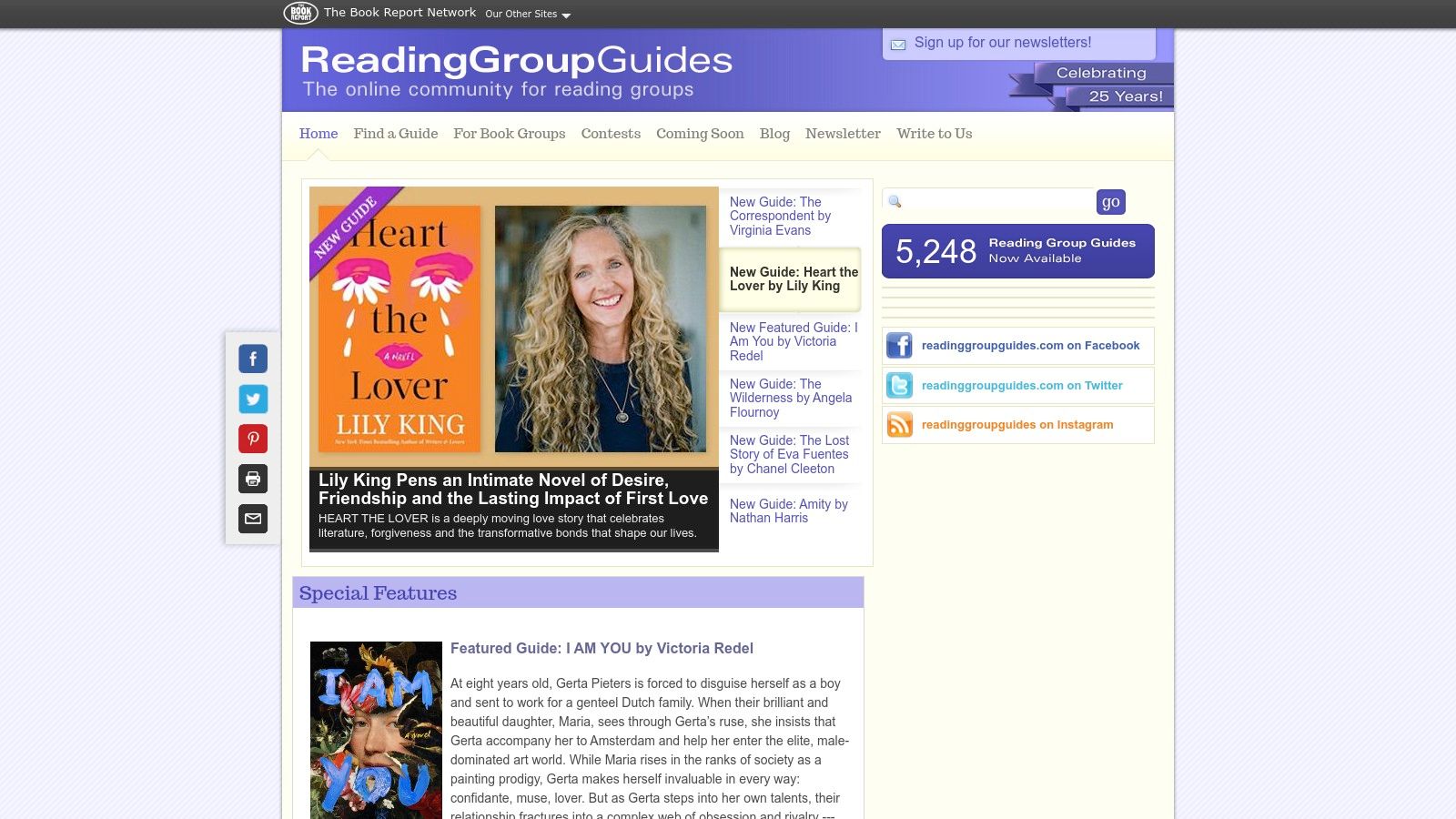
Why It's a Book Club Favorite
ReadingGroupGuides.com significantly reduces the workload for club facilitators. The guides are well-structured, often including a book summary, author biography, and a comprehensive set of thought-provoking questions. This allows organizers to focus on leading the discussion rather than spending hours developing materials.
The platform also offers unique perks, such as monthly contests and the ability to register your book club for a chance to receive free copies of featured books. This not only makes reading more affordable but also introduces clubs to new titles they might not have discovered otherwise. The site even has a section with guides suitable for younger readers, which can be a great starting point for those looking for historical fiction books for young adults.
Key Features for Discussion
- Extensive Guide Library: Search for guides by title, author, or genre to quickly find resources for your next pick. The historical fiction category is particularly robust.
- Contests and Giveaways: Explore the "Contests" section for opportunities to win books for your entire group.
- Book Club Registration: Register your club to receive special newsletters and notifications about new guides and giveaway opportunities.
- Author Interviews: Many guides are supplemented with Q&As with the author, providing exclusive insights that can enrich your discussion.
Book Club Pro-Tip: Before finalizing your next book selection, check ReadingGroupGuides.com to see if a guide is available. Having a ready-made list of questions can be a deciding factor when choosing between two equally compelling titles and guarantees a well-prepared, dynamic meeting.
This website empowers book clubs to have deeper, more structured conversations with minimal prep time. Its vast collection of free resources and added perks make it an essential bookmark for any group dedicated to exploring the rich world of historical fiction.
Top 7 Platforms for Historical Fiction Book Clubs Comparison
| Item | Implementation Complexity 🔄 | Resource Requirements ⚡ | Expected Outcomes 📊 | Ideal Use Cases 💡 | Key Advantages ⭐ |
|---|---|---|---|---|---|
| Amazon Books and Kindle | Moderate (managing options & delivery) | High (large inventory, Prime support) | Wide access to print and digital titles | Hybrid book clubs using print and Kindle | Largest selection, fast shipping, Kindle Unlimited |
| Barnes & Noble | Moderate (in-store and online integration) | Medium (physical stores and membership) | Reliable multi-copy availability, local events | Clubs with local and online purchase needs | Membership benefits, physical pickup, events |
| Bookshop.org | Low (online storefront only) | Medium (partners with indies, shipping) | Supports indie bookstores, ethical shopping | Clubs supporting local independents ethically | Indie support, public list building tools |
| Goodreads | Low (platform for discovery) | Low (user-generated content) | Reader opinions, user reviews, discussion groups | Clubs scouting books and discussion resources | Strong community engagement, extensive lists |
| Libby, by OverDrive | Low (library system dependent) | Low (library card needed, free access) | No-cost digital borrowing and accessibility | Budget-conscious clubs wanting digital lending | Free, cross-device, no late fees |
| Penguin Random House | Moderate (publisher direct sales) | Medium (curated catalog, guides) | Access to curated titles and discussion guides | Clubs wanting publisher-verified editions & guides | Reading group guides, verified editions |
| ReadingGroupGuides.com | Low (resource-only site) | Low (online guides, no inventory) | Free guides and prep support for clubs | Clubs needing discussion prep and giveaways | Extensive free guides, giveaways, contest support |
Bringing History to Life in Your Next Meeting
You’ve explored the digital stacks, from the vast libraries of Amazon and Barnes & Noble to the community-focused shelves of Bookshop.org. You’ve seen how powerful platforms like Goodreads can connect your group, how Libby provides free access through your local library, and how resources like Penguin Random House and ReadingGroupGuides.com offer invaluable discussion materials. Now, armed with this knowledge, you are perfectly equipped to select the next great read for your group and foster a truly memorable discussion. The journey into the past doesn’t end with the last page; it begins when your book club gathers to share their thoughts.
Choosing the right historical fiction books for your book club is about matching a compelling story with your group's unique dynamic. The tools we've discussed are your allies in this process, each offering a distinct advantage. Your task is to align their strengths with your club's specific needs and goals, transforming your selection process from a chore into a strategic part of the experience.
From Selection to Discussion: A Practical Framework
To make your next meeting a resounding success, move beyond just picking a book. Think about the entire lifecycle of your club's reading experience. Here’s a step-by-step guide to leveraging these tools for maximum impact:
- For the Decisive and Data-Driven Club: Use Goodreads to create a poll with three or four top contenders. Let members vote, ensuring everyone feels invested in the final choice. You can then use the book's page to track progress and share initial reactions.
- For the Budget-Conscious and Community-Minded Club: Make Libby your first stop. Before finalizing a choice, have a member check its availability as an ebook or audiobook. This simple step guarantees everyone can access the book for free, removing financial barriers and encouraging participation.
- For the Club That Loves Supporting Indies: Champion Bookshop.org as your official purchasing platform. When you announce the next book, include a direct link to its page on the site. This reinforces your club's values and directly supports independent bookstores with every purchase.
- For the Club That Craves Deeper Insights: Before your meeting, direct everyone to ReadingGroupGuides.com or the publisher's site, like Penguin Random House. Ask each member to come prepared to discuss one specific question from the official guide. This structured approach can prevent lulls in conversation and spark more profound analysis.
Elevating Your Conversation
The best book club discussions don't just recap the plot; they connect the story's past to our present. As your group delves into the narrative, encourage members to think critically about why the author chose this particular moment in time to explore. A deeper appreciation for the author's intent can be gained by understanding the concept of historical significance and how it shapes which stories from the past are told and retold. This perspective can transform a simple chat about characters into a meaningful dialogue about memory, legacy, and the forces that shape history itself.
Ultimately, the goal is to create an environment where curiosity thrives and diverse perspectives are celebrated. The tools and titles in this guide are your starting point. They provide the structure, the access, and the content, but the magic happens when your members come together, ready to explore, question, and connect. By thoughtfully selecting your next read and preparing for a rich discussion, you ensure your book club is not just reading about history but actively engaging with it in a way that is both educational and deeply rewarding.
Ready to discover your next historical fiction obsession? At Number 6 Publishing, we specialize in crafting the kind of immersive, thought-provoking historical narratives that book clubs love. Explore our catalog of award-winning titles and find the perfect story to bring history to life at your next meeting. Visit Number 6 Publishing to find your next great read.
